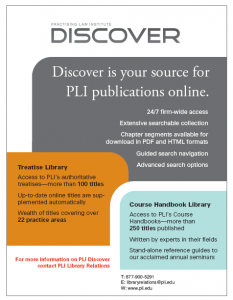The Bankruptcy Deskbook was recently supplemented. That means print subscribers as well as PLI Discover PLUS subscribers have access to updated materials. This update includes:
Patient Care Ombudsman
When the debtor in Chapter 7, 9, or 11 is a “health care business,” the court is required to order the appointment of a patient care ombudsman unless it makes a specific finding that it is unnecessary. Two recent cases help clarify the extensive definition of “health care business” and spell out a four-part test for determining whether a debtor qualifies as such. To learn more, see § 1:3.7 and Discover PLUS subscribers can click here to automatically be taken to Chapter 1.
Adjudication of “Stern Claims”
In Executive Benefits Insurance Agency v. Arkison, the U.S. Supreme Court ruled that when a bankruptcy court is not permitted by Article III of the Constitution to enter a final judgment on a core bankruptcy claim, the bankruptcy court should follow the procedures of the statute and submit to the district court for de novo review proposed findings of fact and conclusions of law. To learn more, see § 2:1.2[C][1] and Discover PLUS subscribers can click here to automatically be taken to Chapter 2.
Exemptions from Property of the Estate
Retirement funds may be exempted under both state and federal law. In Clark v. Rameker, the Supreme Court resolved a split between the Seventh Circuit and the Fifth Circuit and ruled that inherited IRAs are not retirement funds for purposes of section 522(b)(3)(C), thus affirming the Seventh Circuit’s decision that affirmed the bankruptcy court’s order sustaining a trustee’s objection to the debtor’s claimed exemption in such funds. To learn more, see § 7:4 and Discover PLUS subscribers can click here to automatically be taken to Chapter 7.






